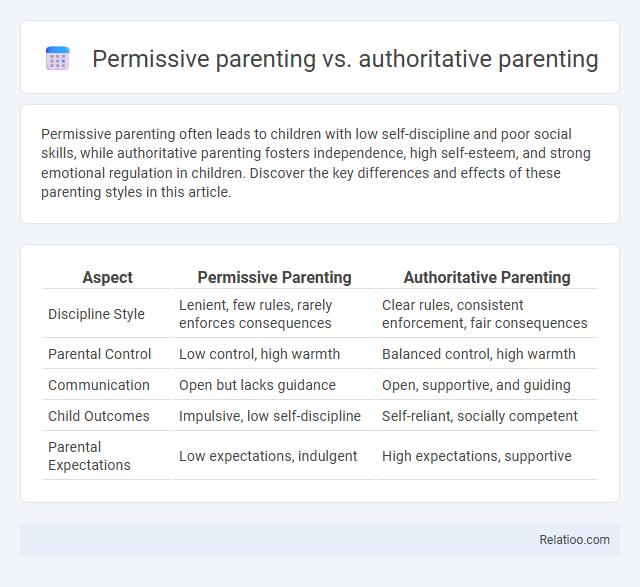Permissive parenting often leads to children with low self-discipline and poor social skills, while authoritative parenting fosters independence, high self-esteem, and strong emotional regulation in children. Discover the key differences and effects of these parenting styles in this article.
Table of Comparison
| Aspect | Permissive Parenting | Authoritative Parenting |
|---|---|---|
| Discipline Style | Lenient, few rules, rarely enforces consequences | Clear rules, consistent enforcement, fair consequences |
| Parental Control | Low control, high warmth | Balanced control, high warmth |
| Communication | Open but lacks guidance | Open, supportive, and guiding |
| Child Outcomes | Impulsive, low self-discipline | Self-reliant, socially competent |
| Parental Expectations | Low expectations, indulgent | High expectations, supportive |
Understanding Permissive Parenting
Permissive parenting is characterized by high responsiveness and low demandingness, often leading to few rules and minimal discipline, which can result in children struggling with self-regulation and authority. Unlike authoritative parenting, which balances warmth and structure to promote independence and social competence, permissive parents prioritize nurturing and acceptance over consistent boundaries. Overindulgence exaggerates permissive tendencies by providing excessive material or emotional rewards, potentially fostering entitlement and poor coping skills in children.
Key Traits of Authoritative Parenting
Authoritative parenting is characterized by high responsiveness and high demandingness, balancing warmth and structure to promote independence while maintaining clear expectations. This style encourages open communication, supports emotional regulation, and fosters self-discipline and social competence in children. Unlike permissive parenting, which lacks boundaries, and overindulgence, which leads to entitlement, authoritative parents provide consistent guidance and nurture autonomy.
Differences in Discipline Approaches
Permissive parenting uses minimal discipline and allows children significant freedom, often leading to inconsistent boundaries and leniency. Authoritative parenting balances firm, clear rules with warmth and support, promoting self-discipline and accountability in children. Overindulgence lacks clear limits and often spoils children, resulting in poor impulse control and difficulty respecting authority.
Impact on Child Development
Permissive parenting often leads to children exhibiting lower self-discipline and higher impulsivity due to the lack of consistent boundaries, while authoritative parenting fosters emotional regulation, social competence, and academic success through balanced support and clear expectations. Overindulgence can result in entitlement, poor frustration tolerance, and difficulties with delayed gratification, negatively impacting long-term motivation and interpersonal relationships. Studies show that authoritative parenting consistently correlates with positive developmental outcomes, whereas permissive and overindulgent styles increase risks for behavioral problems and impaired self-control.
Communication Styles Compared
Permissive parenting uses a lenient communication style that emphasizes warmth and acceptance but lacks clear boundaries, often leading to inconsistent messages. Authoritative parenting balances open, respectful dialogue with firm expectations, fostering mutual understanding and positive behavioral outcomes. Overindulgence involves excessive responsiveness and minimal control, resulting in communication that favors gratification over guidance and hinders the development of self-discipline.
Emotional Outcomes for Children
Permissive parenting often leads to children exhibiting poor emotional regulation and increased impulsivity due to a lack of clear boundaries and guidance. Authoritative parenting fosters emotional resilience and self-regulation by combining warmth with consistent discipline, promoting healthy social competence and reduced anxiety. Overindulgence results in children with fragile self-esteem and difficulties managing frustration, as excessive leniency undermines the development of coping skills.
Academic Performance Influences
Permissive parenting often results in lower academic performance due to limited structure and expectations, while authoritative parenting fosters higher academic achievement through balanced discipline and emotional support. Overindulgence can hinder Your academic progress by encouraging entitlement and lack of motivation. Research shows that students with authoritative parents typically exhibit better self-regulation and study habits, leading to improved grades and school engagement.
Building Self-Esteem in Children
Permissive parenting often leads to low self-esteem in children due to lack of clear boundaries and inconsistent discipline, undermining their sense of responsibility and self-control. Authoritative parenting, characterized by balanced warmth and firm expectations, significantly fosters healthy self-esteem by promoting autonomy, confidence, and social competence. Overindulgence can hinder self-esteem development by creating dependency and entitlement, preventing children from developing resilience and problem-solving skills crucial for self-worth.
Long-Term Effects into Adulthood
Permissive parenting often leads to adults who struggle with self-discipline and face challenges in setting boundaries, while authoritative parenting fosters emotional regulation, independence, and strong social skills that benefit long-term success. Overindulgence can result in entitlement issues and difficulty coping with frustration in adulthood. Your approach to parenting shapes emotional resilience and interpersonal effectiveness well beyond childhood.
Choosing the Right Parenting Style
Choosing the right parenting style significantly impacts your child's development and emotional well-being. Permissive parenting offers freedom but may lead to lack of boundaries, while authoritative parenting balances warmth with clear rules, fostering independence and social competence. Overindulgence risks creating entitlement and poor self-discipline, making authoritative parenting the most effective approach for raising resilient and responsible children.

Infographic: Permissive parenting vs Authoritative parenting
 relatioo.com
relatioo.com